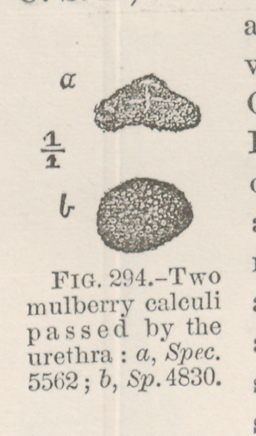Title: Johnson, Andrew (President of U. S.)
Source text: The Medical and Surgical History of the War of the Rebellion. (1861-65.), Part 2, Volume 2 (Washington, DC: Government Printing Office, 1876), 376.
Civil War Washington ID: med.d2e31826
TEI/XML: med.d2e31826.xml
The particulars of a case which furnished two of the specimens of urethral calculi, on account of the eminent position of the subject of it, possess extrinsic interest:
CASE A¹⁰.—President Andrew Johnson, in August and September, 1867, suffered intensely from the frequent recurrence of paroxysms of lumbar pain, dysuria, and other symptoms of nephritic colic; symptoms which his physician, Dr. Basil Norris, U. S. A., ascribed to the passage of a renal calculus. After a few weeks intermission, about the middle of October, another attack of difficult micturition, with tenesmus and great pain, announced that the calculus had entered the vesical end of the urethra. The pain was mitigated by the use of hypodermic injections of sulphate of morphia. On the second day of the paroxysm, the calculus could be felt in the scrotal portion of the canal, and Dr. Norris proposed to attempt its extraction by the aid of a curette or forceps; but the patient objected to operative interference; and, as micturition, though difficult and painful, was still accomplished sufficiently to avert any dangerous vesical accumulation, the expectant and anodyne treatment was continued. During night the calculus was expelled, and, at the morning visit, the patient handed the concretion (FIG. 294 b) to his attendant, remarking that he might exclaim with the old Greek philosopher: Εϋρηκα! The urethral irritation at once subsided, and, on the same day, the President undertook a journey to Boston. The calculus, weighing six grains Troy, was a hard tuberculated ovoid concretion, consisting almost wholly of oxalate of lime. In the spring of 1869, after a similar train of symptoms, a second, somewhat smaller, calculus (FIG. 294 a) was spontaneously expelled. While it was engaged in the urethra, the pain was so excessive that Dr. Norris was summoned to Greenville; but, upon his arrival, March 9, 1869, the offending concretion had escaped. The patient recuperated as rapidly as on the first occasion, and has since enjoyed immunity from calculous disorder. The second concretion was similar in weight, color, and composition to the first, but of irregular form, as indicated in the wood-cut (FIG. 294 a).
